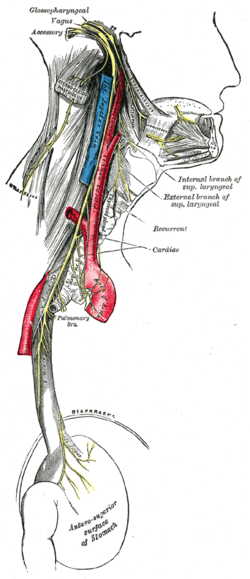Reflex syncope

Editor-In-Chief: Prab R Tumpati, MD
Obesity, Sleep & Internal medicine
Founder, WikiMD Wellnesspedia &
W8MD's medical weight loss NYC, sleep center NYC
Philadelphia medical weight loss and Philadelphia sleep clinics
| Reflex syncope | |
|---|---|

| |
| Synonyms | Vasovagal syncope, Neurocardiogenic syncope, Situational syncope |
| Pronounce | N/A |
| Specialty | N/A |
| Symptoms | Fainting, lightheadedness, nausea, sweating, pallor |
| Complications | Injury from falls |
| Onset | Sudden |
| Duration | Usually brief |
| Types | Vasovagal syncope, Situational syncope, Carotid sinus syncope |
| Causes | Vagal nerve stimulation, emotional stress, pain, prolonged standing |
| Risks | Dehydration, hunger, heat exposure, alcohol consumption |
| Diagnosis | Clinical history, tilt table test, ECG |
| Differential diagnosis | Seizure, orthostatic hypotension, cardiac arrhythmia |
| Prevention | Avoid triggers, increase salt intake, compression stockings |
| Treatment | Lying down, elevating legs, fluid intake |
| Medication | N/A |
| Prognosis | Generally good |
| Frequency | Common |
| Deaths | N/A |
Reflex Syncope is a type of syncope, or fainting, triggered by an automatic (autonomic) reflex response to emotional or orthostatic stress. The condition is characterized by a rapid drop in blood pressure, resulting in a temporary loss of consciousness and muscle strength.
Introduction[edit]
Reflex syncope is also known as neurally mediated syncope or neurocardiogenic syncope. It encompasses several subtypes, including vasovagal syncope, situational syncope, carotid sinus syncope, and postural tachycardia syndrome (POTS).
Pathophysiology[edit]
Reflex syncope is caused by a malfunction in the autonomic nervous system, which controls involuntary functions such as heart rate and blood pressure. In response to certain triggers — such as emotional distress, physical pain, or a sudden change in body position — the nervous system may cause the heart to slow down and the blood vessels in the legs to dilate. This can lead to a sudden drop in blood pressure, depriving the brain of oxygen and causing the person to faint.
Clinical Presentation[edit]
Patients with reflex syncope may experience a variety of symptoms before losing consciousness, including lightheadedness, nausea, sweating, blurred vision, and rapid heartbeat. The fainting episode is usually brief, and the person typically regains consciousness within a minute or two.
Treatment and Management[edit]
Treatment for reflex syncope focuses on avoiding triggers, managing symptoms, and preventing injuries. Patients may be advised to stay hydrated, avoid standing up too quickly, and learn physical maneuvers that can help increase blood flow to the brain. In some cases, medication or a pacemaker may be recommended.
See Also[edit]
Ad. Transform your life with W8MD's Budget GLP-1 injections from $49.99


W8MD offers a medical weight loss program to lose weight in Philadelphia. Our physician-supervised medical weight loss provides:
- Weight loss injections in NYC (generic and brand names):
- Zepbound / Mounjaro, Wegovy / Ozempic, Saxenda
- Most insurances accepted or discounted self-pay rates. We will obtain insurance prior authorizations if needed.
- Generic GLP1 weight loss injections from $49.99 for the starting dose of Semaglutide and $65.00 for Tirzepatide.
- Also offer prescription weight loss medications including Phentermine, Qsymia, Diethylpropion, Contrave etc.
NYC weight loss doctor appointmentsNYC weight loss doctor appointments
Start your NYC weight loss journey today at our NYC medical weight loss and Philadelphia medical weight loss clinics.
- Call 718-946-5500 to lose weight in NYC or for medical weight loss in Philadelphia 215-676-2334.
- Tags:NYC medical weight loss, Philadelphia lose weight Zepbound NYC, Budget GLP1 weight loss injections, Wegovy Philadelphia, Wegovy NYC, Philadelphia medical weight loss, Brookly weight loss and Wegovy NYC
|
WikiMD's Wellness Encyclopedia |
| Let Food Be Thy Medicine Medicine Thy Food - Hippocrates |
Medical Disclaimer: WikiMD is not a substitute for professional medical advice. The information on WikiMD is provided as an information resource only, may be incorrect, outdated or misleading, and is not to be used or relied on for any diagnostic or treatment purposes. Please consult your health care provider before making any healthcare decisions or for guidance about a specific medical condition. WikiMD expressly disclaims responsibility, and shall have no liability, for any damages, loss, injury, or liability whatsoever suffered as a result of your reliance on the information contained in this site. By visiting this site you agree to the foregoing terms and conditions, which may from time to time be changed or supplemented by WikiMD. If you do not agree to the foregoing terms and conditions, you should not enter or use this site. See full disclaimer.
Credits:Most images are courtesy of Wikimedia commons, and templates, categories Wikipedia, licensed under CC BY SA or similar.
Translate this page: - East Asian
中文,
日本,
한국어,
South Asian
हिन्दी,
தமிழ்,
తెలుగు,
Urdu,
ಕನ್ನಡ,
Southeast Asian
Indonesian,
Vietnamese,
Thai,
မြန်မာဘာသာ,
বাংলা
European
español,
Deutsch,
français,
Greek,
português do Brasil,
polski,
română,
русский,
Nederlands,
norsk,
svenska,
suomi,
Italian
Middle Eastern & African
عربى,
Turkish,
Persian,
Hebrew,
Afrikaans,
isiZulu,
Kiswahili,
Other
Bulgarian,
Hungarian,
Czech,
Swedish,
മലയാളം,
मराठी,
ਪੰਜਾਬੀ,
ગુજરાતી,
Portuguese,
Ukrainian


